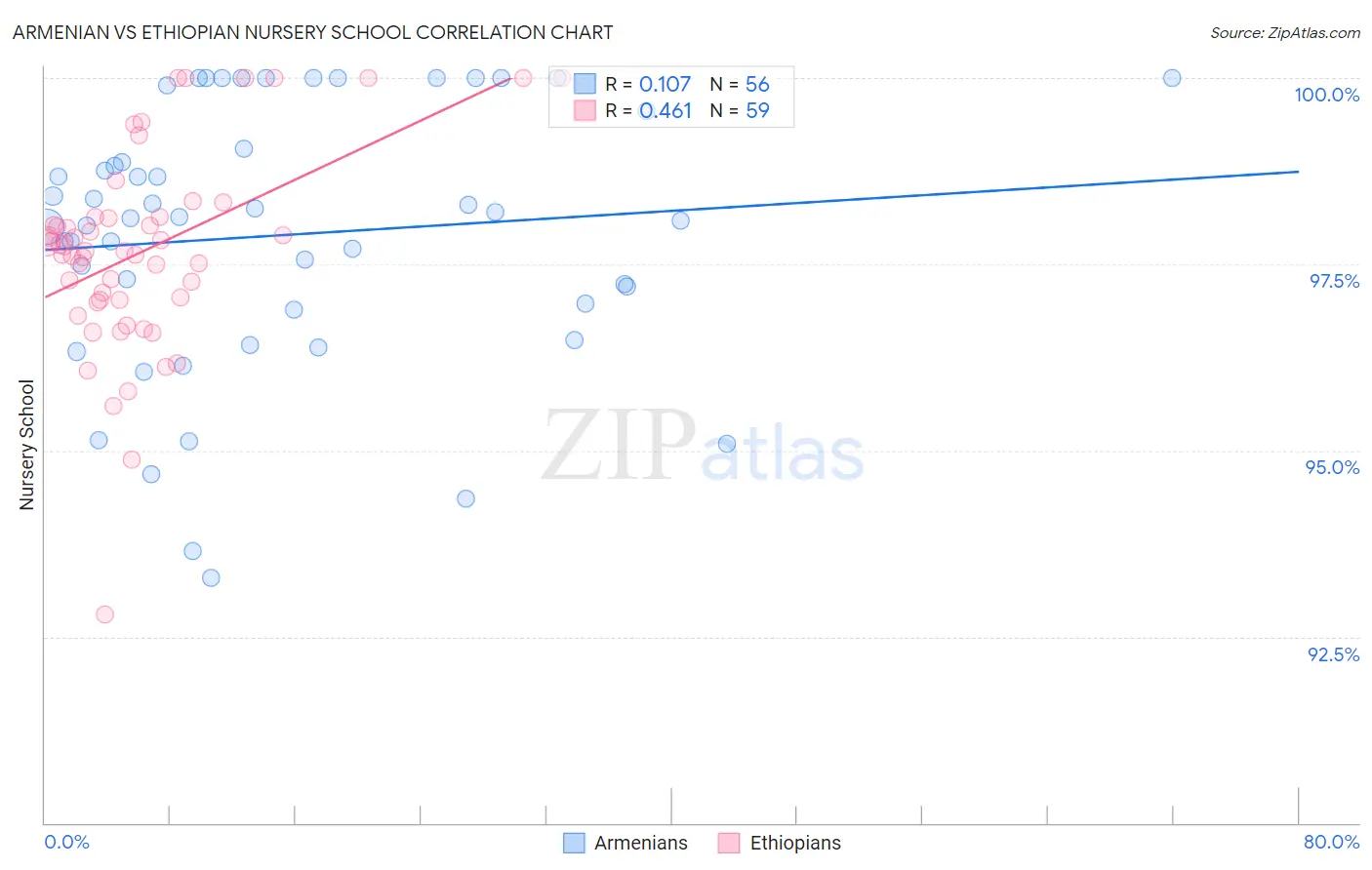Armenian vs Ethiopian Nursery School
COMPARE
Armenian
Ethiopian
Nursery School
Nursery School Comparison
Armenians
Ethiopians
97.6%
NURSERY SCHOOL
0.4/ 100
METRIC RATING
259th/ 347
METRIC RANK
97.6%
NURSERY SCHOOL
0.8/ 100
METRIC RATING
251st/ 347
METRIC RANK
Armenian vs Ethiopian Nursery School Correlation Chart
The statistical analysis conducted on geographies consisting of 310,954,660 people shows a poor positive correlation between the proportion of Armenians and percentage of population with at least nursery school education in the United States with a correlation coefficient (R) of 0.107 and weighted average of 97.6%. Similarly, the statistical analysis conducted on geographies consisting of 223,220,814 people shows a moderate positive correlation between the proportion of Ethiopians and percentage of population with at least nursery school education in the United States with a correlation coefficient (R) of 0.461 and weighted average of 97.6%, a difference of 0.050%.

Nursery School Correlation Summary
| Measurement | Armenian | Ethiopian |
| Minimum | 93.3% | 92.8% |
| Maximum | 100.0% | 100.0% |
| Range | 6.7% | 7.2% |
| Mean | 97.9% | 97.7% |
| Median | 98.1% | 97.7% |
| Interquartile 25% (IQ1) | 96.9% | 97.0% |
| Interquartile 75% (IQ3) | 99.3% | 98.1% |
| Interquartile Range (IQR) | 2.4% | 1.1% |
| Standard Deviation (Sample) | 1.8% | 1.3% |
| Standard Deviation (Population) | 1.7% | 1.3% |
Demographics Similar to Armenians and Ethiopians by Nursery School
In terms of nursery school, the demographic groups most similar to Armenians are Immigrants from South America (97.6%, a difference of 0.0%), Cuban (97.6%, a difference of 0.010%), Immigrants from Ethiopia (97.6%, a difference of 0.010%), Jamaican (97.6%, a difference of 0.020%), and Fijian (97.6%, a difference of 0.020%). Similarly, the demographic groups most similar to Ethiopians are Immigrants from Africa (97.6%, a difference of 0.0%), Peruvian (97.6%, a difference of 0.010%), Immigrants from Middle Africa (97.6%, a difference of 0.010%), Indian (Asian) (97.6%, a difference of 0.010%), and Immigrants from Eastern Africa (97.6%, a difference of 0.010%).
| Demographics | Rating | Rank | Nursery School |
| Bolivians | 1.0 /100 | #245 | Tragic 97.6% |
| Peruvians | 1.0 /100 | #246 | Tragic 97.6% |
| Immigrants | Middle Africa | 0.9 /100 | #247 | Tragic 97.6% |
| Indians (Asian) | 0.9 /100 | #248 | Tragic 97.6% |
| Immigrants | Eastern Africa | 0.9 /100 | #249 | Tragic 97.6% |
| Immigrants | Senegal | 0.9 /100 | #250 | Tragic 97.6% |
| Ethiopians | 0.8 /100 | #251 | Tragic 97.6% |
| Immigrants | Africa | 0.8 /100 | #252 | Tragic 97.6% |
| Immigrants | Iraq | 0.7 /100 | #253 | Tragic 97.6% |
| Immigrants | Congo | 0.7 /100 | #254 | Tragic 97.6% |
| Immigrants | Asia | 0.7 /100 | #255 | Tragic 97.6% |
| Yaqui | 0.6 /100 | #256 | Tragic 97.6% |
| Immigrants | Colombia | 0.6 /100 | #257 | Tragic 97.6% |
| Jamaicans | 0.6 /100 | #258 | Tragic 97.6% |
| Armenians | 0.4 /100 | #259 | Tragic 97.6% |
| Immigrants | South America | 0.4 /100 | #260 | Tragic 97.6% |
| Cubans | 0.4 /100 | #261 | Tragic 97.6% |
| Immigrants | Ethiopia | 0.4 /100 | #262 | Tragic 97.6% |
| Fijians | 0.3 /100 | #263 | Tragic 97.6% |
| Taiwanese | 0.3 /100 | #264 | Tragic 97.6% |
| Assyrians/Chaldeans/Syriacs | 0.3 /100 | #265 | Tragic 97.6% |